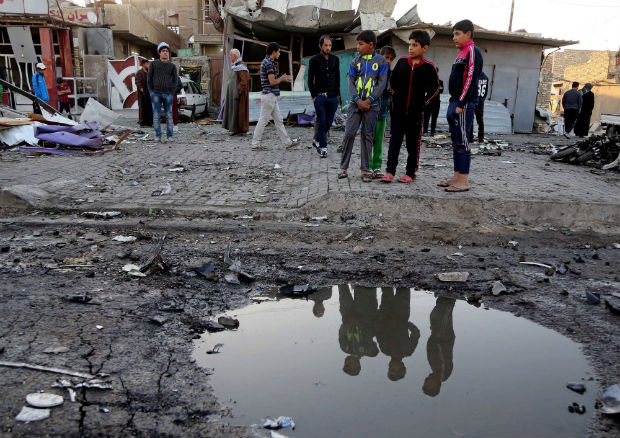Iraqi PM sacks 24 officials over ISIS

In this Sunday, Nov. 9, 2014 file photo, civilians inspect the aftermath of a car bomb explosion in Sadr city, Baghdad, Iraq after a series of bombings in and around the capital killed at least 43 people. AP
BAGHDAD — Iraq’s prime minister said Monday he retired 24 officials from the Interior Ministry as part of efforts to restructure the country’s security apparatus and remove those who failed to confront the crisis caused by the Islamic State group’s onslaught.
Haider al-Abadi’s announcement came as the Sunni extremist group attacked a police checkpoint near Iraq’s border with Syria, killing at least 15 Iraqi policemen in an assault that underscored the depth of the country’s turmoil.
In Syria, the U.S. Central Command said a U.S. airstrike struck a target associated with the so-called Khorasan group, which Washington says is a special cell within the al-Qaida-linked Nusra Front that is plotting attacks against Western interests. CENTCOM said the attack took place near Aleppo, and was among 27 airstrikes since Friday that mainly targeted Islamic State group militants in Kobani and Raqqa in northern Syria.
The strike on the Khorasan group marked the fifth time the U.S. has targeted Nusra, al-Qaida’s Syria branch, as part of its broader campaign against the IS group in Syria and Iraq.
Iraqi Prime Minister al-Abadi’s move to send two dozen Interior Ministry officials into retirement is part of his efforts to “restructure the security forces and make them more effective in the face of terrorism,” according to statements on his official Twitter and Facebook pages.
Article continues after this advertisementAl-Abadi, who became prime minister in September, has already retired a number of senior military officials in a push to reform the force. Monday’s statements did not identify the individuals or the ranks of officials sent into early retirement.
Article continues after this advertisementThe June fall of Iraq’s second-largest city, Mosul, was a turning point in the war against the jihadi group that calls itself the Islamic State. The U.S.-trained Iraqi military, harassed for months by small-scale attacks, buckled almost instantly when militants advanced on the city. Commanders disappeared, pleas for more ammunition went unanswered and in some cases, soldiers stripped off their uniforms and ran from the fight.
Since then, U.S.-led coalition airstrikes have served to reinforce Iraqi and Kurdish security forces as they battle the Sunni militants, but major victories have been sparse.
Many have blamed the army’s poor performance on al-Abadi’s predecessor, Nouri al-Maliki, saying he replaced top officers with inexperienced or incompetent political allies in order to monopolize power. From 2010 until his resignation in August, al-Maliki had also held both the interior and defense portfolios, in part because lawmakers could not agree on nominees for them.
Once al-Abadi was sworn in and his government approved, it took six weeks to fill the critical posts of interior and defense ministers.
Monday’s deadly attack on the checkpoint near the Syrian border took place in the town of al-Walid, according to a senior army official. At least 15 Iraqi border policemen were killed, the official said, and at least five officers were wounded. A government official in Iraq’s Anbar provincial council confirmed the report. Further details were not immediately available.
In its blitz earlier this year, the Islamic State group seized most of the border crossings between Iraq and Syria. It also overrun a large part of Iraq’s Anbar and Ninevah provinces and now controls about one-third of both Iraq and Syria.
Also Monday, the U.N. Assistance Mission for Iraq said that 1,232 Iraqis were killed and 2,434 were wounded in violence and terror attacks in November. Of those killed, at least 296 were members of Iraqi and Kurdish forces, as well as militias who fight alongside the troops.
The figures were a slight decrease from October, when the U.N. said at least 1,273 Iraqis had been killed.
Also last month, at least 402 people were killed in western Anbar province, according to the provincial Health Directorate, the U.N. mission said. Most of the victims died in the provincial capital of Ramadi, a battleground between the IS group and Iraqi troops. In Baghdad province, at least 332 people were killed in November, the U.N. said.
And in the Shiite town of Balad, 80 kilometers (50 miles) north of Baghdad, at least eight people died and 20 were wounded Monday after mortar shells hit a cluster of homes and a small market, police officials said.
All officials spoke on condition of anonymity because they were not authorized to talk to media.
Those killed in Balad included a woman and a child. The town has lately seen heavy clashes between Islamic State militants and Iraqi forces.